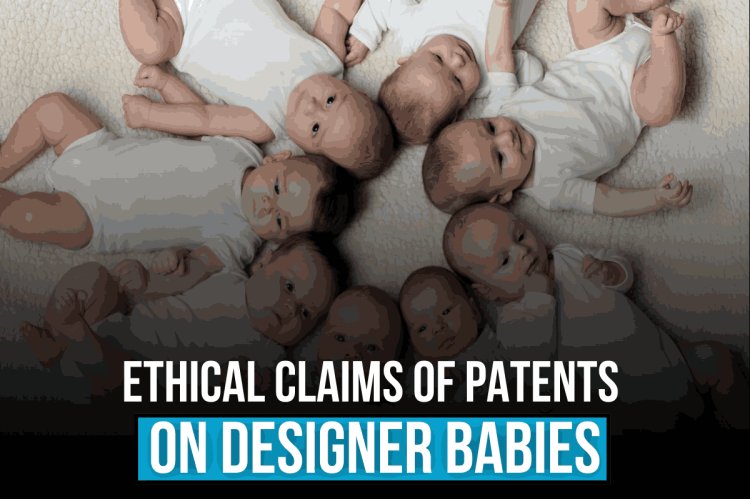ETHICAL CLAIMS OF PATENTS ON DESIGNER BABIES
The article explores the ethical implications of patenting technologies used in the creation of designer babies, which involve genetic modifications to embryos for disease prevention or trait enhancement. The discussion covers the ownership and control of human genes, accessibility issues, moral objections, consent concerns, and the balance between innovation and ethical boundaries. By examining case studies like Myriad Genetics and the CRISPR babies scandal in China, the article highlights the complexities of patenting human genetic technologies. It argues for a robust regulatory framework and public engagement to ensure that advancements in genetic engineering are applied responsibly and equitably.

INTRODUCTION:
The term "designer babies" describes genetic engineering, in vitro fertilization, and other technologies used to choose or alter specific genetic traits in embryos. This could vary from getting rid of genetic disorders to improving physical, intellectual, or other characteristics. The ethical consequences of these alterations are intricate and heavily discussed, especially regarding the patenting of technologies utilized in the development of designer babies. Patents on genetic modification techniques spark concerns regarding ownership, availability, and ethical limits of manipulating human genes. This article discusses the ethical arguments surrounding patents for designer babies, assessing both the possible advantages and the notable ethical issues.
UNDERSTANDING DESIGNER BABIES AND PATENT CLAIMS:
Designer babies are commonly linked with the utilization of CRISPR-Cas9 and similar gene-editing methods that enable accurate changes in the embryos' DNA. These changes can help avoid genetic disorders or improve characteristics like intelligence or physical skills. Patents in this area frequently involve the particular methods and technologies applied in genetic alterations.
Patents give inventors sole rights over their creations, allowing them to regulate the usage, manufacture, and dissemination of their patented technology. When it comes to designer babies, patenting might entail companies or individuals having sole ownership over specific genetic alterations. This regulation raises important ethical concerns, such as worries about the commodification of human life, disparities in genetic technology access, and possible power misuse.
ETHICAL CLAIMS AND CONCERNS:
- Ownership and Control Over Human Genes: One of the most contentious ethical issues is the notion of owning and controlling human genes. Patents on genetic modification techniques could lead to monopolies over certain genetic traits, making them available only to those who can afford them. This raises the question: should companies or individuals have the right to control human genetic traits? The idea of owning a part of the human genome is deeply unsettling for many, as it suggests a commodification of human life.
- Equity and Access: Patents can create barriers to access, limiting the availability of genetic modification technologies to the wealthy. This could exacerbate existing social inequalities, creating a genetic divide where only the rich can afford to have "designer" children free from certain diseases or with enhanced traits. The ethical concern here is that patenting could lead to a society where genetic enhancements are a luxury available only to a privileged few, deepening socioeconomic divides.
- Moral and Religious Objections: Many ethical claims against the patenting of technologies for designer babies are rooted in moral or religious beliefs. Some argue that genetic modifications interfere with natural processes or "playing God," challenging fundamental beliefs about the sanctity of human life. Others fear that it could lead to a slippery slope, where the line between therapy and enhancement blurs, ultimately resulting in eugenics—the pursuit of "improving" the human race through selective breeding.
- Consent and the Rights of the Child: Another significant ethical concern is the issue of consent. Designer babies are unable to consent to the genetic modifications made on their behalf. This raises questions about the rights of the child and whether parents or companies should have the power to make irreversible decisions about a child's genetic makeup. The potential long-term impacts of these modifications on the individual and future generations are not yet fully understood, making such decisions ethically precarious.
- Innovation vs. Ethical Boundaries: Proponents of patenting argue that it incentivizes innovation by rewarding inventors and companies for their research and investment in genetic technologies. However, this perspective is often challenged by the ethical boundaries that such innovations cross. The commercialization of human genetics, critics argue, should not be driven by profit motives but rather by a commitment to the welfare of humanity. Balancing innovation with ethical considerations remains a key challenge.
THE PATH FORWARD: BALANCING INNOVATION WITH ETHICS
To address the ethical concerns associated with patenting technologies for designer babies, it is crucial to establish a robust regulatory framework that prioritizes the welfare of individuals and society over commercial interests. International guidelines and regulations should be developed to ensure that genetic technologies are used responsibly and equitably. This could involve limiting the scope of patents in human genetics, ensuring affordable access to genetic therapies, and setting clear ethical boundaries for what is permissible in genetic modifications.
Moreover, public engagement and dialogue are essential to navigating the ethical landscape of designer babies. Society must collectively decide on the boundaries of human genetic modification, taking into account diverse perspectives, including those of ethicists, scientists, religious groups, and the general public.
CONCLUSION:
The ethical claims of patents on designer babies are complex and multifaceted, encompassing issues of ownership, accessibility, consent, and the moral implications of genetic modification. While patents can drive innovation, they also risk commodifying human genetics and deepening social inequalities. Navigating these ethical challenges requires careful consideration of the impacts on individuals and society, guided by a commitment to ethical principles and human rights. As the field of genetic modification continues to advance, it is imperative that ethical considerations remain at the forefront of discussions and policymaking, ensuring that the benefits of these technologies are shared equitably and responsibly.












